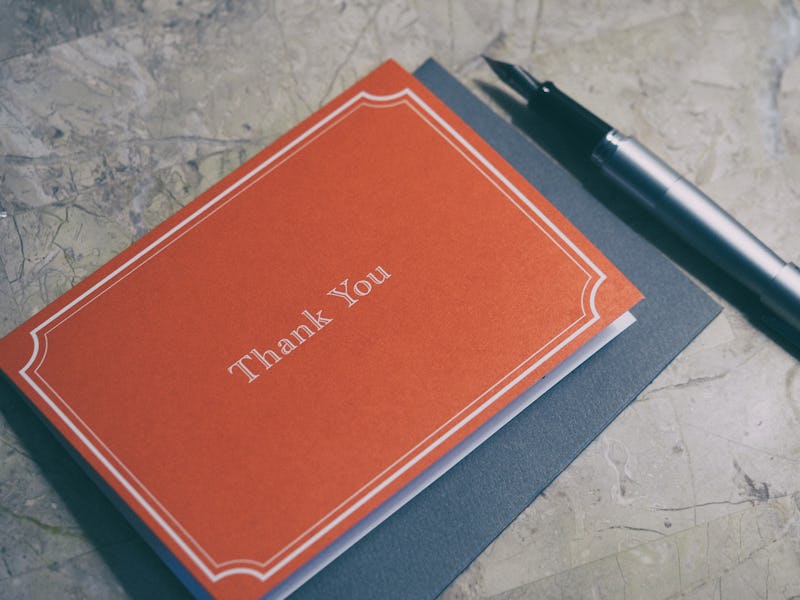Are Thank-You Notes a Job Hunting Necessity? What We Can Make of the Fury
Why a simple piece of advice set off an internet fury.

Personal finance is not, typically, a hot-button topic. As long as you rein in the condescension a bit, and as long as you’re reasonably aware that not everyone can afford to max out their 401(k) contributions or buy their groceries in bulk, most people are not going to blow up your inbox with hate mail when you try to share a piece of personal finance advice that’s been helpful to you. It is a genre that indexes blessedly low on hot takes.
This is an adapted version of our weekly Strategy newsletter, which offers reporting and insights about your career, life, and finances. Sign up for free here.
Or, at least, this is how it used to be until some seriously spicy opinions blew up the internet last weekend. One of them, from a Business Insider executive managing editor, argued that you should not hire people who don’t send thank-you notes after interviewing for a job. People … had thoughts! Most people took issue with the proscription, which tech writer Mike Isaac memorably dubbed “some Patrick Bateman shit,” referring to the famous literary sociopath. In the now-predictable backlash to the backlash, others wondered what the problem was. What’s the difference between, say, expecting a thank-you note and expecting a job applicant to show up on time?
It was the career advice heard round the world: “I’ve been hiring people for 10 years, and I still swear by a simple rule: If someone doesn’t send a thank-you email, don’t hire them,” read the headline on a piece by Jessica Liebman, Business Insider’s executive managing editor. She elaborated:
“As a hiring manager, you should always expect a thank-you email, and you should never make an offer to someone who neglected to send one,” read Liebman’s piece. “It signals that the person wants the job — or rather, no thank-you email signals the person probably doesn’t want the job.”
People raised a lot of good points. Aren’t job interviews supposed to be a two-way street? (Yes). Isn’t the expectation that prospective hires grovel for jobs kind of exploitative? (Yes.) Is it fair to have secret disqualifiers that aren’t listed on the job description? (No!) Alison Green, who tackles these questions all the time in her famous blog, “Ask a Manager,” told Inverse that expecting thank-you notes reinforces a dated power dynamic.
“The idea of rejecting anyone who doesn’t send a thank-you is preposterous,” Green says. “A hiring manager who does that is a hiring manager who’s not clear on what the must-have qualities and skills are to excel in the role … and who subscribes to an increasingly outdated, old-school way of hiring where employers think they hold all the cards. Good candidates and good interviewers know that interviews are two-way streets; there shouldn’t be a dynamic where candidates are expected to suck up to interviewers.”
Green stressed that, OF COURSE, sending thank-you notes is a good thing. People like them. (You, dear Strategy reader, likely know this — I link to this damn study pretty much every week.) And there are also probably some jobs where not sending a thank-you note might reasonably be considered disqualifying. If you work in fundraising, for example, a big part of your job will literally be sending people thank-you notes for supporting your cause. In fields like communications, it’s also probably a box you’ll want to check, as one PR agency founder pointed out to me on Twitter.
But let’s be real. There’s still a decontextualization problem here, which is that very, very few people actually work in jobs where it’s their actual responsibility to send thank-you notes all day. While I wouldn’t necessarily compare expecting thank-you notes to an abominable practice like asking brain teasers in a job interview, it’s worth noting the willingness among hirers to embrace this kind of decontextualization in hiring has been linked to narcissism and sadism on their part. When people maintain these unrelated professional dealbreakers, they’re saying more about themselves than they are about you or your readiness for the job.
“People who hire need to be thoughtful about what it truly takes to excel in any given role, and not create artificial tests that have nothing to do with that,” Green advises. “At its core, expecting a thank you is about reinforcing old-school power dynamics in interviewing.”
In short, the fury here isn’t over the merits of thank-you notes, which are objectively a kind thing to send to people. And it likely does make a little bit of a difference as far as your prospects go, too. Eighty percent of hiring managers say they’re helpful, according to a Monster survey, but only 24 percent of hiring managers say they get them. It’s a good way to play the odds. You’ll stand out, remind the interviewer who you were, and generally seem like a nicer person.
The fury, then, is about something else entirely. It is about entitled employers, unwritten rules, secret whisper networks, dated expectations, and the other bullshit power dynamics that continue poisoning our increasing joke of a meritocracy. Abstain from the thank-you note, and you may hurt your chances a bit. But remember that with a certain kind of employer and a certain kind of boss, being passed over for a job isn’t the worst thing that can happen. In some cases, it’s a blessing in disguise.